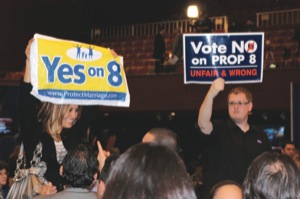san diego
California voters pass same-sex marriage ban
Attorneys file suit to invalidate Prop 8
Published Thursday, 06-Nov-2008 in issue 1089
Joining voters in Arizona and Florida on Election Day, Californians passed Proposition 8, a state constitutional amendment banning gay and lesbian couples from marrying. Advocates for same-sex marriage immediately prepared legal challenges to the initiative on Wednesday.
With 95 percent of precincts reporting Wednesday, the ban led 52 to 48 percent and overturned the California Supreme Court’s historic ruling that paved the way for same-sex marriage in May.
More than $73 million was spent on both sides of the campaign, which grew more heated as Election Day neared.
The California Supreme Court ruled in May that Proposition 22, the voter-approved ban on same-sex marriage in 2000, violated the constitutional rights of gay and lesbian couples. More than 18,000 same-sex couples have married since, and Attorney General Jerry Brown said those marriages will stand, though legal challenges are possible.
Despite similar ballot initiatives in Arizona and Florida, all eyes were on Proposition 8 in California. The battle was characterized as crucial to the gay rights movement, and Proposition 8’s passage dealt a blow to same-sex marriage supporters in the Golden State.
“People believe in the institution of marriage,” Frank Schubert, co-manager of the Yes on 8 campaign, said to the Associated Press after declaring victory early Wednesday. “It’s one institution that crosses ethnic divides, that crosses partisan divides. … People have stood up because they care about marriage and they care a great deal.”
The No on 8 campaign did not concede Wednesday, despite news outlets reporting its loss.
In a joint statement to the press, executive director of Equality California Geoff Kors and executive director of the National Center for Lesbian Rights Kate Kendell said the election is too close to call.
Kors and Kendell, both members of the No on Prop 8 executive committee, said more than three million absentee and provisional ballots have yet to be counted.
“Given that fundamental rights are at stake, we must wait to hear from the Secretary of State [today] about how many votes are yet to be counted as well as where they are from,” the two said. “Because Prop 8 involves the sensitive matter of individual rights, we believe it is important to wait until we receive further information about the outcome.”
Proposition 8 took a lead in the early election returns on Tuesday, 55 to 45 percent shortly after polls closed in California at 8 p.m. Just after 9 p.m., it led 54 to 46 percent, though many precincts in Los Angeles and San Francisco had not been fully counted. Wednesday at 2 a.m. it held the 52 to 48 percent margin, and news outlets called the election.
In San Diego County, 54 percent of voters approved Proposition 8; in Los Angeles County, 50.4 percent of voters favored the same-sex marriage ban. Voters rejected the ban throughout the Central Coast and Bay Area, but favored Proposition 8 by wide margins in the Central Valley.
“There are between three and four million votes outstanding and we don’t know which counties they are from or which parts of counties they are from,” said Kevin Tilden, a member of the No on Prop 8 executive committee involved with the campaign in San Diego. “This is unprecedented. Never before has there been a repeal of peoples’ rights on the ballot and until every vote is counted, we’re not going to move forward; we will wait until the decision is final to do anything.”
After Barack Obama declared victory in the race for president Tuesday, supporters and opponents of Proposition 8 at San Diego’s Golden Hall began chanting for and against the measure. The energy around the divisive initiative was thick until midnight, when, with returns not indicating a clear victor, supporters and opponents headed home.
San Francisco City Attorney Dennis Herrera and Los Angeles and Santa Clara counties filed a petition Wednesday to invalidate Proposition 8. Herrera said the Yes on 8 campaign waged a “ruthless campaign of falsehood and fear,” and said he is confident the California Supreme Court will strike down the amendment.
“Make no mistake that their success in California has dramatically raised the stakes,” he said. “What began as a struggle for marriage equality is today a fight for equality itself.
Attorney Gloria Allred and her clients Robin Tyler and Diane Olson, who were plaintiffs in the Supreme Court’s marriage cases, also filed Wednesday for an immediate stay of Proposition 8.
The American Civil Liberties Union, Lambda Legal and the National Center for Lesbian Rights also filed suit Wednesday to invalidate Proposition 8.
Exit polls for The Associated Press found that Proposition 8 received critical support from black voters who flocked to the polls to support Obama for president. About seven in 10 blacks voted in favor of the ban, while Latinos also supported it and whites were split.
Tilden said the grassroots campaign for No on 8 raised more money – nearly $40 million – and mobilized more volunteers and voters than any campaign for a state ballot measure has before.
“We’ve made huge headway toward changing peoples hearts and minds; we have a lot to be proud of,” Tilden said. “They [supporters] talked to friends, family members, coworkers, and they sacrificed their time, they sacrificed their finances, and we’d like to say to them, ‘Thank you. Your efforts make a difference. Hang in there and wait to see the end result.’”
In Florida, 62 percent of voters passed Amendment 2, amending the state’s constitution to ban same-sex marriage. In Arizona, Proposition 102, also writing a ban on same-sex marriage into the state constitution, was approved by 56 percent of voters.
Connecticut and Massachusetts are the only states where same-sex marriage is allowed. The Connecticut Supreme Court ruled in favor of same-sex marriage last month, and gay and lesbian couples are expected to be begin marrying Nov. 12.
|
|
Copyright © 2003-2025 Uptown Publications


